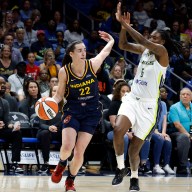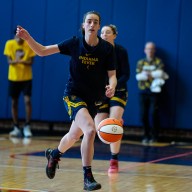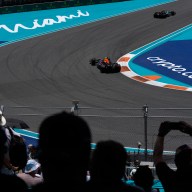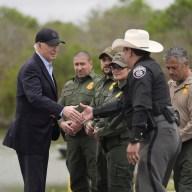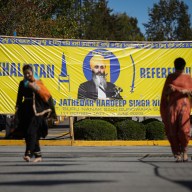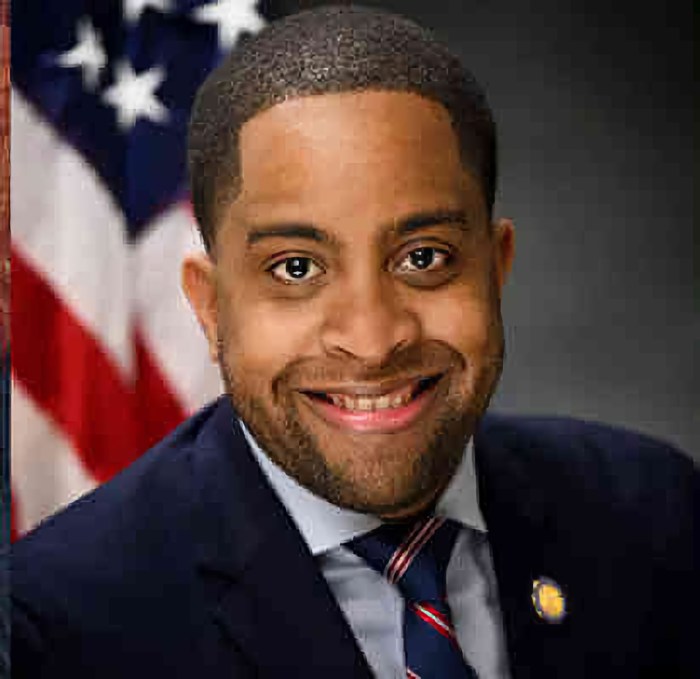 Sivasspor’s technical director Roberto Carlos is seen before the Turkish Super League match between Galatasaray and Sivasspor at Turk Telekom Arena.
Sivasspor’s technical director Roberto Carlos is seen before the Turkish Super League match between Galatasaray and Sivasspor at Turk Telekom Arena.
Credit: Getty Images
Brazil’s legendary left backRoberto Carlostalks to Metro about coaching Turkish Super League’s Sivasspor, his physics-defying “Impossible Goal” of 1997 and his home nation’s prospects at this summer’s World Cup.
What are the differences between being player and coach?
You learn a lot. The things that I didn’t see as a player, I now see as a coach. To be a coach you have to find tactical systems, think a lot about different plans, but also have fun. I feel more complete, I have improved a lot. I’m happy doing this.
Speaking about things you’ve learned in your career, did you always want to be a part of football?
In Brazil, you have to be either a footballer or a singer. I had faith to be somebody. I had faith to be someone. When I was born, my father gave me a little ball. He always wanted to play. When I was 3 years old, I started to play in the fields of Garça, a neighborhood of Sao Paulo. We played in the streets, dirt roads full of potholes.
At age 13, I started to go to training. But I never really thought I was a great player. However, my mother saw me playing around the city and, even though I was playing bad, she would say to me, “How good you are!” So, I gave a lot of value to my mother, because for her, I never played bad.
How do you recall that 35-meter “Impossible Goal” you scored against France in June 1997?
The first thing I remember [captain] Dunga saying is, “It’s too far away for you.” After the match, the coach Mário Zagallo told me that he had said to the bench that if I would score a goal from there, from that distance, he would leave the bench. Of course, he didn’t do that, because he was the coach.
The wind was coming from the right side, and the kick didn’t have much effect on it, but I knew it was going towards the goal. Before I kicked it, I thought, “Let’s see what happens.” And that goal has made history.
Many people have been analyzing this goal, but there is no explanation. It’s the stuff of destiny that I will never forget.
What did you say to the French players after you scored?
It’s funny because everyone thought the ball was going out. And when I kicked it, the French players turned around to see the ball and then started to walk away. And Zidane was laughing and told me, “Just you can do things like that.” And I replied, “You too.”
Let’s talk about the summer’s World Cup. What are your thoughts on the event being played in your home country?
It’s going to be excellent. There have been a lot of protests, with people not understanding why so many expensive stadiums are built in front of poor schools and hospitals. I think people understand with the government that if it can build good stadiums, it can build good schools and hospitals, too.
The Brazilian team will be under enormous pressure to perform.
Brazilian people always want more. We were runners-up in 1998, but it seemed as if we came last. Brazil will always want to be in first place. My country is a country of suffering, people want the national team to win as a pass on our economic crises, to give us some happiness. So, we are under enormous pressure, we have to play knowing that we’re responsible for people’s happiness and cleaning our country’s problems.
And how do you think this Brazilian group of players will do?
I think the team will have a great World Cup as they did in the Confederations Cup. The coach Luis Felipe Scolari is making a solid base with young players.
Much talk is about Brazil’s 22-year-old rising star, Neymar. Will it be his World Cup?
I don’t think so. Although he’s young, Brazil has players who must take responsibility before him. I know the team will play well but they can’t put Neymar under a lot of pressure – he has only just arrived playing club football in Europe. There will have to be others who will take up the pressure.
Roberto Carlos: Fact sheet
Early Career: Born in Sao Paulo, Brazil, on April 10, 1973. Joined Union Sao Joao in 1991 and won his first cap for Brazil the following year.
Joined Palmeiras in 1993, but failed to make the Brazil square for World Cup 1994 in the U.S. Won two consecutive league titles there.
Moved to Inter Milan in 1995, scored a 30-yard free kick on his debut against Vicenza. Just played one season at the Serie A side.
Real Madrid: Played 512 times (Real Madrid’s most capped foreign-born player) and scored 66 goals for the Galacticos including many impressive free kicks. This included three UEFA Champions League trophies in 1998, 2000 and 2002, as well as four La Liga titles.
Fenerbache: In 2007, Roberto Carlos moved to Turkey to play for Fenerbache. Represented the club 103 times, bagging two Turkish Super Cup titles.
Anzhi Makhachkala: After a brief spell at Brazil’s Corinthians in 2010, Carlos joined Russian mega-rich side Anzhi Makhachkala in 2011, in a reported deal of 10 million euros. His time in Russia was blighted after suffering racist abuse at a number of games.
Managerial career: Was interim coach at Anzhi in early 2012. Became manager of Turkish Super League side Sivasspor in June 2013.
International career: Played in three World Cups, winning the tournament in 2002. Won 125 caps.
Highlight: Scored one of the most memorable international goals when he netted a swerving free kick in an exhibition game against France in June 1997. The physics-defying strike is dubbed the “Impossible Goal.”

